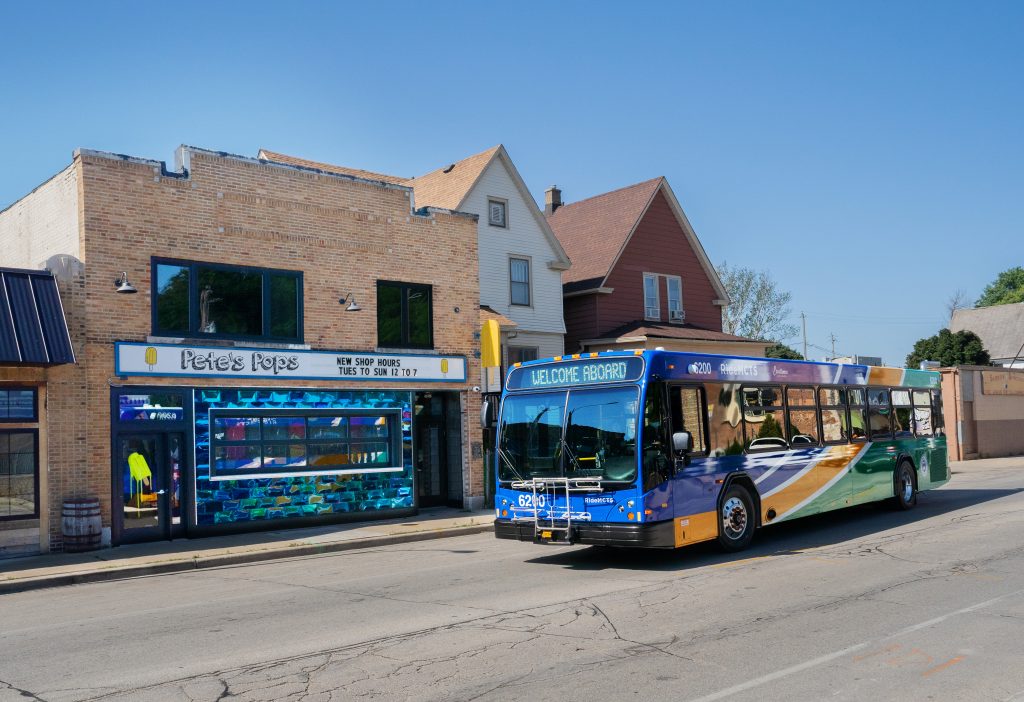
New Gillig Clean-Diesel Bus. Photo Courtesy of MCTS.
The Milwaukee County Transit System (MCTS) is taking a big step toward regionalization and bidding to manage the City of Waukesha‘s system: Waukesha Metro Transit.
If awarded the contract, MCTS would manage Waukesha Metro like a third-party government contractor. The City of Waukesha would maintain responsibility for funding the operations and infrastructure needs of the system.
The move is the first major play by MCTS to create a regional transit system, after the launch of a new fare system being adopted by other transit systems in southeastern Wisconsin.
“Ultimately, the hope is to illustrate how a regional approach to public transportation is a key component in growing the region economically,” according to a report by MCTS Deputy Director Julie Esch, which will go before the Milwaukee County Board later this month.
MCTS is already a quasi-governmental private entity and not a government agency. In 1975, Milwaukee County created the non-profit Milwaukee Transport Services, Inc. (MTS) to take over operation of the privately owned and operated Milwaukee & Suburban Transport Company. MCTS, as an entity, is controlled by the MTS board, which is in-turn controlled by the county.
MCTS already has a close working relationship with Waukesha Metro. The two transit agencies collaborated on a connection between MCTS’ new Connect 1 bus rapid transit route and Waukesha Metro route 1 at the Milwaukee Regional Medical Center; an attempt at replacing the former GoldLine service that ran into Waukesha.
Waukesha Metro also recently joined MCTS’ fare collection system WisGo, so riders can already pay fares for both transit services through the same mobile application.
The Milwaukee transit system has a long-term structural deficit, which has been winnowing transit service in the county for years, at least until the COVID-19 pandemic infused the system with millions of dollars. The funding will run dry in 2027, and a projected $12.6 million budget deficit will surface. Regionalizing the system, and attracting new financial support from the state or federal government is one way MCTS officials hope to avoid drastic cuts to service. In other words, the transit system would be grown out of its funding crisis.
MCTS is also considering bidding on operating the City of Milwaukee’s streetcar, called The Hop, and taking over FlexRide, a relatively new city-to-suburbs, job-focused transit service, as Urban Milwaukee previously reported.
“Although state legislation does not allow regional transit authorities nor provides for dedicated funding, of any kind, there are opportunities for efficiencies and improved customer experience,” Esch notes.
Waukesha Metro is a modest transit system compared to MCTS. It has a $7.1 million annual budget and 23 buses it operates on 10 routes, which radiate outward from the city’s Downtown Transit Center, serving major local destinations like Waukesha Memorial Hospital, shopping centers and schools, along with a paratransit service with smaller buses and vans.
If MCTS ends up running Waukesha Metro, it may facilitate development of a cross-county bus rapid transit route. The Southeastern Wisconsin Regional Planning Commission spotlighted Waukesha Metro Route 1 for development of a bus rapid transit service in a recent five-year plan for the system. Metro 1 already connects to the county’s nine-mile Connect 1, which runs east and west across Milwaukee County between Downtown and the Milwaukee Regional Medical Center.
“MCTS believes it is best positioned to operate Metro in accordance with RFP requirements and within federal, state, and local regulations,” Esch wrote in the board report. “Additionally, from a regional perspective, MCTS operation of Metro is a logical next step in transit growth for existing and future riders.”
MCTS Bids to Run Waukesha Buses